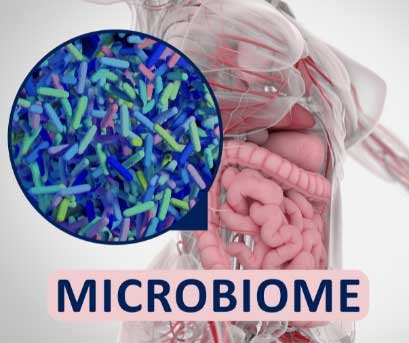You’ve heard the saying: “you are what you eat” right? A more accurate sentiment though, is “you are what your microbiome eats”!
The lining of our gut is covered in organisms which create a micro-ecosystem called the microbiome. You may or may not know that this little ecosystem within us has a huge role to play in our mood, our behaviours and our health.
A few examples of what our gut microbes do include:
- Help in maintaining a healthy weight
- Help with healthy immune responses
- Help protect against metabolic disorders
- Help produce short-chain fatty acids
- Production of vitamins
- Production of about 95% of the serotonin in our body
The way we eat affects our microbiome, and has a huge impact on its health, which then impacts our health. There are hundreds of different species of bacteria in our gut, and keeping that balance is key! When you are healthy, you can trust that your gut is in balance and will do all that it should. However, most of us find that either through deficient diets, chronic health conditions, use of medication, lack of sleep or other lifestyle issues, our gut bacteria and therefor health are at a degree of imbalance.
This balance can be maintained either through helping the ones we have grow by providing them the foods they like (these are pre-biotic foods) or by adding more good live bacteria to the mix (these are probiotics). Synbiotics refers to a supplement which combines both the bacteria (probiotic) and the food it needs (prebiotic), but we’ll get to that later.
Prebiotics
Prebiotics are plant fibres, they help feed and stimulate the growth of healthy bacteria in the gut, as well as enhance their activity. These fibres aren’t digestible by the body and so they pass through out digestive system to become food for bacteria and other microbes.
They can be found in plant-based sources you’re probably already consuming such as flax, hemp and chia seeds, oats and legumes, fruits and vegetables like bananas, asparagus, kiwis and Jerusalem artichokes. They can also be found in fermented foods such as kefir, sauerkraut, kimchi, miso and tempeh.
Not all fibre is prebiotic, some insoluble fibre can’t be broken down by the gut bacteria either and is used to bulk up your stools, helping you have regular bowel movements, preventing constipation and discomfort.
Following the nutritional guidelines for fibre will aid your digestion twice then: by ensuring regular happy bowel movements and by ensuring healthy gut bacteria. Aim to eat 30 grams daily of fibre in your regular diet. If you are currently far off of that make sure you increase your fibre intake slowly while adding extra water in order to prevent discomfort. If you find that you’re adding fibre and not tolerating it well you should consult a naturopath to make sure you’re eating the right kind of fibre for you.
Probiotics
Probiotics are live bacteria which we may ingest in order to directly add to the population of healthy microbes in our gut. A single dose may include a particular strain of microbe or blend of microbes.
Research into the use of probiotic supplementation has found benefits not only in digestive issues, but a very wide range of conditions, from blood pressure to mental health.
Probiotics can be found naturally in fermented foods such as kimchi, tempeh and sauerkraut – where they are readily available with prebiotics, and are often sold in supplement form. There are many strains used in supplements and finding the correct strains for you is key. Examples for this are that for digestive health probiotics rich in bifidobacterial work best, whereas for urogenital health lactobacillus strains work better.
However, as we now know of the importance of prebiotics as well, it won’t surprise you to learn that most of the literature shows that probiotic use doesn’t build the cultures in our gut long term, unless we also ensure that they are eating correctly with adding prebiotic sources as well. That’s where synbiotic supplements come in, by combining probiotic with prebiotic the bacteria has a higher chance of staying viable until it reaches its target (your gut).
Each persons’ microbiome is completely unique, and that’s why there’s no fool proof way of knowing which would work best for you aside from taking a microbiome test, however working with a naturopath means you can use their knowledge of research and clinical experience to help you find the best solution.
Prebiotics and probiotics are vital for the health of your gut and your body in general and consuming more of them is easily achieved!
Incorporate live culture foods on a daily or weekly basis, ensure plenty of fibre and you’re there!




